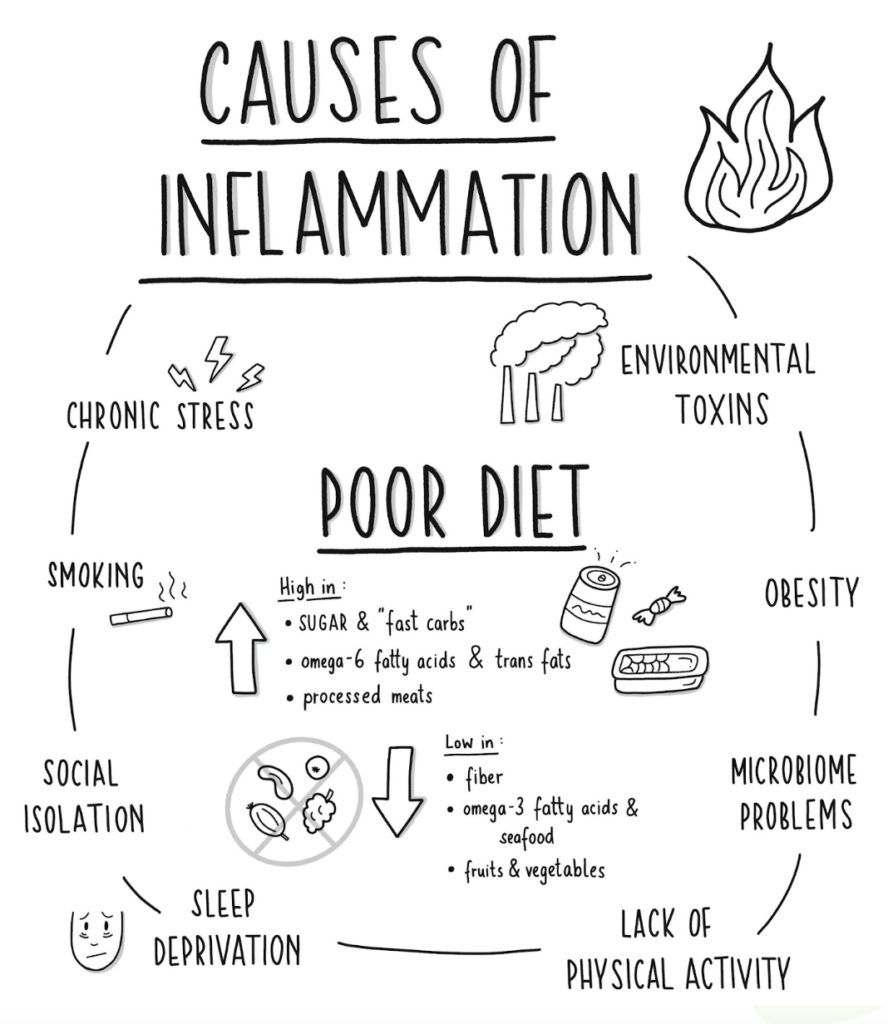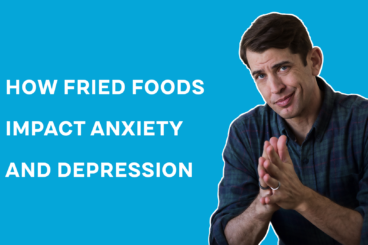Table of Contents
Let’s talk about inflammation and the things that you can do in your everyday life to reduce inflammation. In nutritional psychiatry we increasingly understand that inflammation and inflammatory processes being overactive are not good for our brain health or our mental health. What’s great about that is that it gives us some options and some hope that we can do a lot to change our lifestyle, to lead to more mental health, more mental fitness and less depression and anxiety.

Here is an illustration from my new book Eat to Beat Depression and Anxiety. I wanted illustrations in the book because there are a lot of new concepts in mental health, like inflammation and the microbiome and having an illustration on the page allows us to try to understand and visualize them so we can make use of these scientific concepts to promote our health. Inflammation is our body’s alarm system. It is how all of our immune cells respond to infections. For example, when you’re injured, you get scratched and will see redness, swelling, heat and some loss of function. So cells in our body have this alarm system waiting and ready to ring. Inflammation is essential but an overactive alarm system isn’t good. That’s excess inflammation. We want to try and fight that. Here are some things that contribute to inflammation.
Poor diet
Poor diet, especially, a Westernized industrial diet is bad for our health. Part of the reason it is so bad is because it fuels inflammation. If you were going to design a diet that was bad for health and mental health, you’d essentially design the Western industrialized diet. The reason is that we’re eating a lot of sugars and industrialized fats, which are empty calories. We need B vitamins, magnesium, zinc, and protein and we’re getting the majority of our calories without any of the vitamins and minerals. This in part, contributes to inflammation. We also eat in a way that leads to a lot of weight gain and particularly weight gain of central adiposity. This is fat around our abdominal organs. It releases inflammatory factors and helps trigger or keep our body in an inflammatory state.
Environmental toxins
Environmental toxins is another way to cause inflammation. One way to limit environmental toxins is to exercise in a park or next to water instead of on city streets or next to busy highways. Doing this doesn’t avoid all environmental toxins but it is a way we can decrease environmental toxins. Another great way to do that is looking at how you use plastic in your life and avoiding plasticizers.
Obesity
We talked a little bit about obesity and how it can contribute to inflammation. This isn’t to in any way, shame individuals who are struggling with weight, but simply to note, that’s one of the headwinds that’s going on and part of what contributes to low energy and low mood is certainly this inflammation.
Microbiome
Another contributor to inflammation is microbiome problems which refers to not having a diverse set of bacteria residing in your colon. The microbiome is the collection of all the organisms in our gut. We understand the microbiome has a big role in our immune system and in regulating inflammation and this is one of the reasons in nutritional psychiatry, we’re recommending more fermented foods and more fibrous foods. There’s an interesting study from Stanford which showed the individuals eating a lot of fermented foods can improve and modulate the immune system in positive ways.
Lack of physical activity
Lack of physical activity is another contributor to inflammation. A sedentary lifestyle really isn’t what our body was made to do. So staying active is just critically important from an inflammatory standpoint. An active lifestyle filled with lots of nutritious foods is how people are going to stay at a healthy weight but it’s also going to mean that the process of inflammation doesn’t contribute to things like weight gain.
Sleep deprivation
Sleep deprivation is a major problem in terms of a modern lifestyle. A lot of individuals are getting five to six hours of sleep a night. It’s poor quality sleep and is interrupted frequently. There isn’t a lot of melatonin, the hormone that puts us to sleep, floating around because it disappears when there’s light and everybody wakes up and looks at their phones. I’ve struggled with my sleep hygiene in the past. I started monitoring my sleep a year ago. It made a huge difference and really taught me that when we think we get seven or eight hours of sleep a night, we probably don’t. Working on your sleep is critical because sleep is when you take waste products out of the brain. We have a new course called Healing The Modern Brain, which has a number of modules all about improving sleep hygiene. The idea is that one way to fight inflammation is letting the brain do what it does best which is rest and recover during sleep.
Social isolation
Social isolation also contributes to inflammation, which is surprising to a lot of people, but it’s one of the tenets of mental fitness that’s very important for us to actualize. It’s important to build a social network or community. Building a community of friends, family, or if you’re a member of a church, is a critical part for us to feel engaged and connected, and to minimize inflammation and inflammatory factors.
Smoking
Smoking or vaping tobacco products is a huge contributor to inflammation. When you put smoke in your lungs it is just like setting off an alarm system that your body is on fire and your body doesn’t like that. So there’s a lot of inflammation in smoking. If you’re a smoker there are all kinds of free resources and ways to help you modulate, decrease and hopefully stop using tobacco products on a regular basis to keep your brain super healthy and not inflamed.
Chronic stress
Finally, there’s chronic stress which perhaps this is the most important. Chronic stress is the stress that is with us every day where we’re tense, worried, and overreacting a lot because we’re anxious, irritable, and stressed. Battling chronic stress is critical to your brain health. That’s why it’s important to develop tools, whether those are breathing tools, getting a partner to exercise with, learning some meditation, using music to calm you down or journaling, there are lots of different ways to deal with chronic stress.
Inflammation isn’t this scary, horrible thing that’s lurking everywhere and in everything we eat. There’s a lot that you can do about inflammation in terms of making lifestyle choices that help over time, shift your body and shift you into having a more regulated inflammatory and immune system. I hope this helps you take some actions in everyday life.



